Every morning, you step on the scale. You hold your breath. You stare. And if the number is higher than yesterday, you feel like you’ve failed. But what if the scale is lying to you?
Weight doesn’t tell the whole story. It can’t measure your energy, your mood, your strength, or how well you sleep. It doesn’t know if you finally cooked a meal at home instead of ordering takeout. It doesn’t care that you climbed a flight of stairs without gasping. It doesn’t notice when your jeans fit looser, or when you stopped reaching for sugar just to get through the afternoon.
That’s why so many people burn out on weight loss journeys-not because they didn’t try, but because they were measuring the wrong things.
Why the Scale Lies
Weight fluctuates daily. Not because you gained fat or lost muscle, but because of water. Salt. Hormones. What you ate last night. Whether you drank enough water. The time of day. Even your menstrual cycle. A 2- to 5-pound swing in one day is normal-and meaningless.
Think about it: if you ate a salty meal on Tuesday, you might weigh two pounds more on Wednesday. Does that mean you gained fat? No. It means your body held onto water. But if you’re only watching the scale, you’ll think you’ve failed. You’ll feel discouraged. You might quit.
Meanwhile, your body could be changing in powerful ways that the scale never shows. Your blood sugar is dropping. Your blood pressure is improving. Your digestion is smoother. You’re sleeping through the night. You’re no longer dizzy after standing up. These are real wins. But they don’t show up on a digital readout.
What Are Non-Scale Victories?
Non-scale victories-often called NSVs-are any improvements in your health, energy, or habits that have nothing to do with the number on the scale. They’re the quiet, everyday wins that build real, lasting change.
These aren’t vague feelings. They’re measurable, observable changes. You can track them. You can celebrate them. And when you do, you stop tying your self-worth to a number that changes with the tide.
Here’s what real non-scale victories look like, broken down into categories:
- Biochemical: Your HbA1C dropped from 6.8% to 6.1%. Your triglycerides fell. Your fasting blood sugar is now in the normal range. Your doctor says your liver enzymes are improving.
- Functional: You can tie your shoes without bending over awkwardly. You no longer need a seatbelt extender on flights. You carry groceries up two flights of stairs without stopping. You can cross your legs comfortably when sitting.
- Behavioral: You cooked five home-cooked meals this week. You swapped soda for sparkling water. You planned your meals on Sunday and stuck to it. You stopped eating while scrolling on your phone.
- Psychosocial: You no longer feel guilty after eating a dessert. You stopped checking your body in the mirror every hour. You feel less anxious about food. You actually enjoy meals again.
- Physical: You sleep 7 hours straight. You wake up without needing caffeine. Your joint pain is down. You can walk 30 minutes without stopping. You’ve started enjoying movement-not because you have to, but because it feels good.
One patient I worked with lost zero pounds over three months. But she stopped needing her diabetes medication. She started walking with her granddaughter every evening. She cooked her first full meal from scratch in 10 years. She cried when she realized she hadn’t checked her blood sugar in a week. That’s progress. That’s victory.
How to Start Tracking Non-Scale Victories
Tracking NSVs isn’t complicated. You just need to shift your focus.
Start with one area that matters most to you. Is it energy? Sleep? Movement? Digestion? Pick one. Then, write down one small goal.
Instead of: "I want to lose 10 pounds."
Try: "I want to drink 6 glasses of water every day for the next two weeks."
Or: "I want to walk for 20 minutes, three times a week, without stopping."
Or: "I want to eat dinner without screens at least four nights this week."
These are SMART goals-Specific, Measurable, Achievable, Relevant, Time-bound. They give you something real to aim for. And when you hit it? Celebrate. Write it down. Tell someone. Take a photo of your meal. Put a sticker on your calendar.
Keep a simple log. Not a fancy app. Just a notebook or a notes app on your phone. Every week, ask yourself:
- What did I do differently this week?
- How do I feel now compared to last week?
- What’s something I didn’t do that I used to?
That’s it. No scale needed.

Why This Works Better Than Weight Loss
Weight loss is temporary. Behavior change is permanent.
When you focus on the scale, you’re chasing a number. But when you focus on habits, you’re building a life. And habits stick. Even if you gain a few pounds back, you still have the skills to get back on track.
People who track non-scale victories are more likely to stick with healthy habits long-term. Why? Because they see progress every day. They don’t wait for the scale to move. They celebrate small wins. And those wins add up.
One study from the National Institutes of Health found that people in obesity treatment programs rated non-scale victories as equally important as weight loss itself. That’s not a fluke. It’s proof that real health isn’t about pounds-it’s about how you live.
Imagine this: You’ve been eating more vegetables, walking every day, and sleeping better. Your blood pressure is normal. Your doctor says your cholesterol is down. You feel lighter, calmer, stronger. But the scale hasn’t budged. Do you give up? Or do you say, "I’m doing everything right. I just need to keep going?"
Non-scale victories give you the answer.
What to Do When You’re Stuck
It’s normal to feel stuck sometimes. You might think: "I’m doing everything right, but nothing’s changing."
That’s when you look beyond the scale.
Ask yourself:
- Have I been more consistent with meals?
- Do I feel less stressed about food?
- Have I started doing something I actually enjoy?
- Am I sleeping better?
- Have I stopped doing something that was hurting me-like late-night snacking or skipping breakfast?
If the answer is yes to any of these, you’re moving forward-even if the scale says otherwise.
And if you’re not seeing any changes? That’s a sign to adjust your plan, not your mindset. Maybe you need more sleep. Maybe you’re over-exercising. Maybe you’re not eating enough protein. Talk to a dietitian. Get your labs checked. Try a different approach. But don’t quit because the scale hasn’t moved.
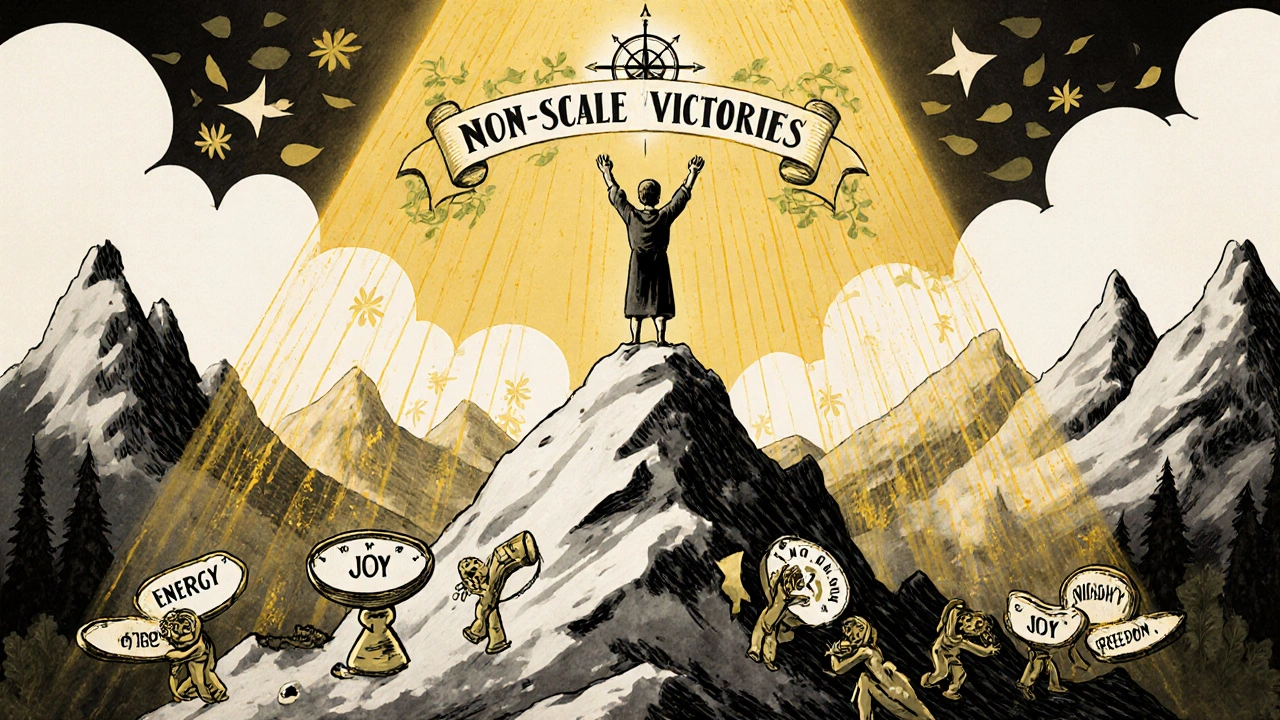
Real People, Real Wins
Here are real examples from people who stopped obsessing over weight:
- A 58-year-old man stopped using his CPAP machine after improving his sleep habits and losing abdominal fat-without losing weight on the scale.
- A woman with prediabetes replaced sugary coffee with black coffee and started walking after dinner. Her A1C dropped from 6.4% to 5.6% in four months. She didn’t lose a pound.
- A teenager with anxiety started cooking dinner with her mom three nights a week. She stopped binge-eating. She said, "I finally feel like I’m in control."
- A man in his 60s started swimming twice a week. He didn’t lose weight, but he could now play with his grandkids without getting winded. He said, "That’s the best thing I’ve done in years."
These aren’t outliers. They’re people who stopped waiting for permission to feel successful. They found their wins-and kept going.
Final Thought: Your Body Is More Than a Number
Weight is just one data point. It doesn’t define your health. It doesn’t measure your discipline. It doesn’t reflect your courage.
Real health is waking up without dread. It’s choosing a salad because you want to feel good-not because you’re punishing yourself. It’s laughing during a walk with a friend. It’s sleeping through the night. It’s saying no to sugar without guilt.
These are the victories that last.
So stop waiting for the scale to change. Start looking for the changes that already happened.
You’re doing better than you think.
Can I still weigh myself if I’m focusing on non-scale victories?
Yes, but don’t let it control your mood. Weigh yourself no more than once a week, at the same time of day, under the same conditions. Use it as a data point-not a verdict. Your non-scale victories are the real indicators of progress.
What if I don’t see any non-scale victories after a few weeks?
That’s okay. Progress isn’t always obvious. Start by tracking one habit-like drinking water or walking daily. Give it time. Sometimes, the biggest changes happen under the surface: better sleep, lower inflammation, improved mood. These take weeks to notice. Be patient. Keep showing up.
Are non-scale victories only for people trying to lose weight?
No. They’re for anyone who wants to feel better. Whether you’re managing diabetes, reducing stress, improving sleep, or just wanting more energy-non-scale victories help you see progress in ways that matter. Health isn’t about size. It’s about function, feeling, and freedom.
How do I know if a non-scale victory is real?
If it’s specific and measurable, it’s real. "I feel better" is vague. "I haven’t needed painkillers for my knees in three weeks" is real. "I used to eat cereal for dinner three nights a week-I haven’t done it in a month" is measurable. Track the behavior, not just the feeling.
Can non-scale victories help with emotional eating?
Absolutely. When you start noticing victories like "I didn’t eat when I was stressed," or "I called a friend instead of reaching for snacks," you’re rewiring your brain. You’re proving to yourself that you can handle emotions without food. That’s powerful-and it lasts longer than any diet.
If you’re ready to stop letting the scale dictate your worth, start today. Write down one non-scale victory you’ve already had-even if you didn’t notice it before. Then, celebrate it. You’ve earned it.
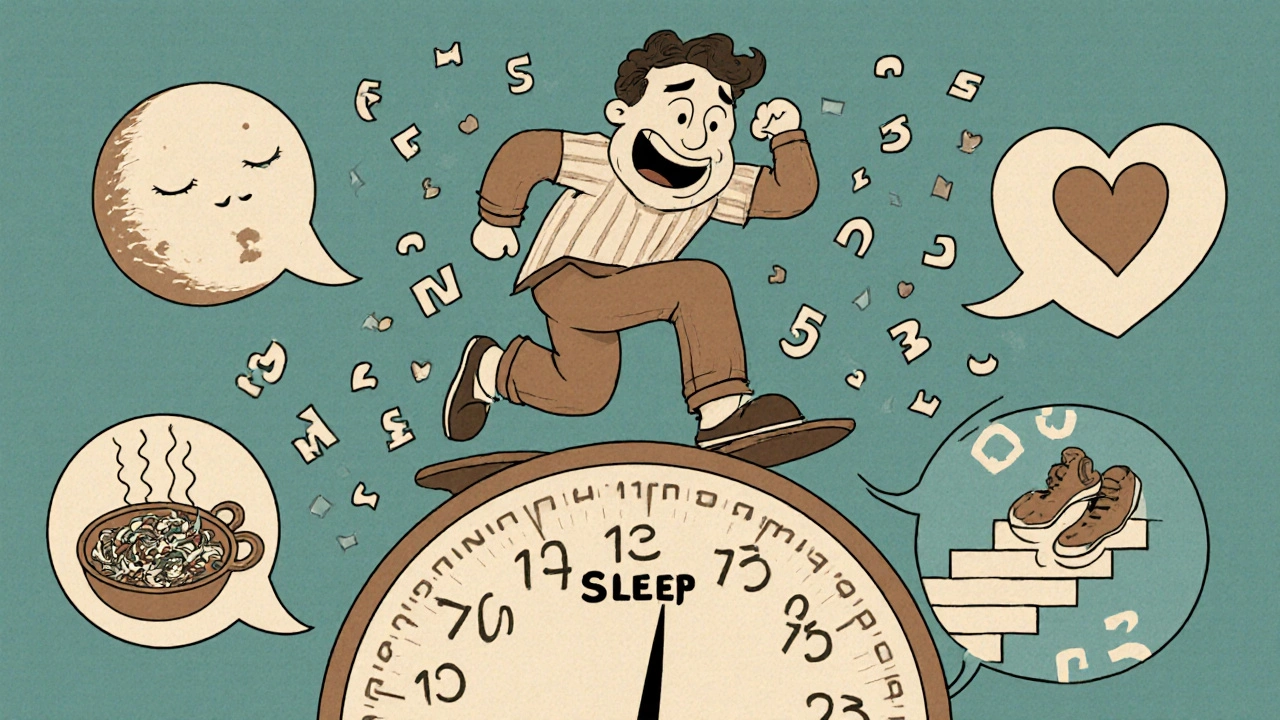
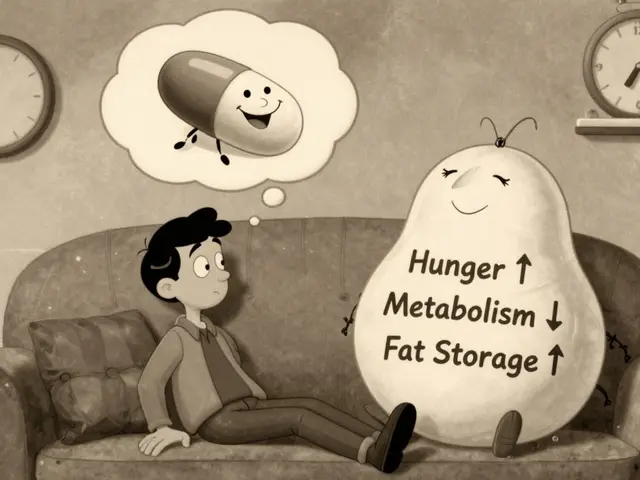
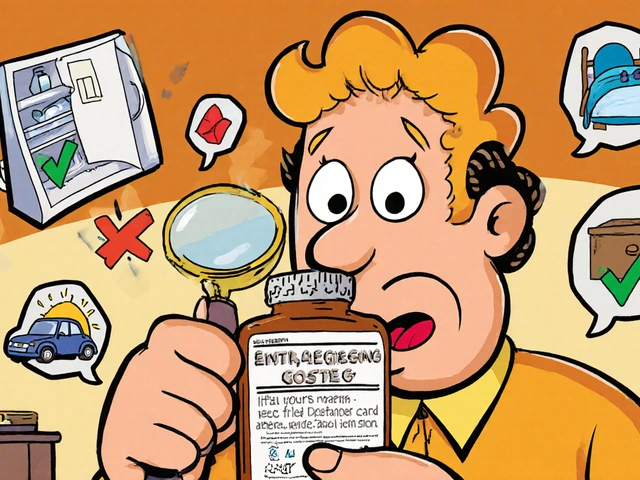
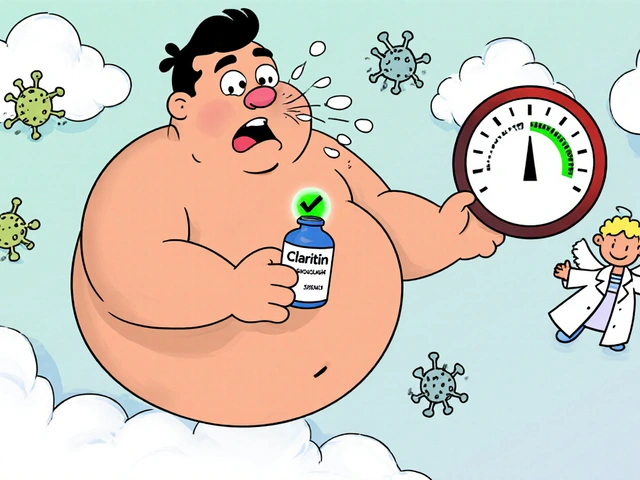


Comments
Aarti Ray
November 28, 2025
i used to cry every time i stepped on the scale
now i just notice how i can run after my niece without getting winded
thats my win
Alexander Rolsen
November 29, 2025
This is the most unscientific, feel-good nonsense I've read all week. Weight is the ONLY objective metric. Everything else is anecdotal. If you're not losing pounds, you're not losing fat. Stop deluding yourself.
Leah Doyle
November 30, 2025
OMG YES!!! I stopped weighing myself for 3 months and I finally noticed I could fit into my favorite jeans again 😭 I didn't even realize I'd been holding onto that shame for years. Thank you for writing this!
Alexis Mendoza
November 30, 2025
The scale is just a number. But the way you feel when you climb stairs without gasping? That's real. The way you sleep? That's real. The way you stop punishing yourself for eating bread? That's real. Real things last. Numbers fade.
Michelle N Allen
December 2, 2025
I mean I guess if you want to feel good about yourself without actually changing anything maybe this works but like I don't know I just think if you're not losing weight then you're not doing anything right and honestly why bother tracking all these other things when the scale is right there staring at you every morning
Madison Malone
December 4, 2025
This is so important. I used to think I was failing because the scale didn't move. Then I realized I was sleeping better, I was cooking more, I was actually enjoying food for the first time. Those things mattered more than any number. You're not broken. You're becoming.
Graham Moyer-Stratton
December 4, 2025
Scale is truth. Everything else is noise. Stop making excuses. Lose the weight or accept you're lazy.
tom charlton
December 4, 2025
The concept of non-scale victories represents a profound shift in how we conceptualize health. Rather than reducing human well-being to a single quantifiable variable, this approach acknowledges the multidimensionality of physiological, psychological, and behavioral health. It is both scientifically valid and deeply humane.
Jacob Hepworth-wain
December 6, 2025
I tried this last year. Didn't lose weight but I stopped bingeing after midnight. Started walking with my dog. Got my blood pressure down. I didn't need the scale to tell me I won.
Craig Hartel
December 8, 2025
I love this. My mom is 70 and she started dancing in the kitchen again. She doesn't care about weight. She cares about moving without pain. That's the real win. Keep sharing these stories!
Chris Kahanic
December 8, 2025
Interesting perspective. I've been tracking my sleep and energy levels instead of weight for the past six months. The changes are subtle but consistent. I'm not sure I'd call them victories, but they're certainly improvements.
Geethu E
December 9, 2025
You people are so obsessed with numbers you forget what health really means. I'm diabetic and I stopped checking my weight. Now I check my sugar. I cook with my kids. I walk to the market. I feel alive. That's more than any scale can give you.
anant ram
December 10, 2025
I was skeptical. But I started writing down one NSV every night. I didn't realize I'd stopped eating chips at 2 a.m. until I saw it on paper. I didn't even know that was a problem. Thank you for helping me see it.
Write a comment